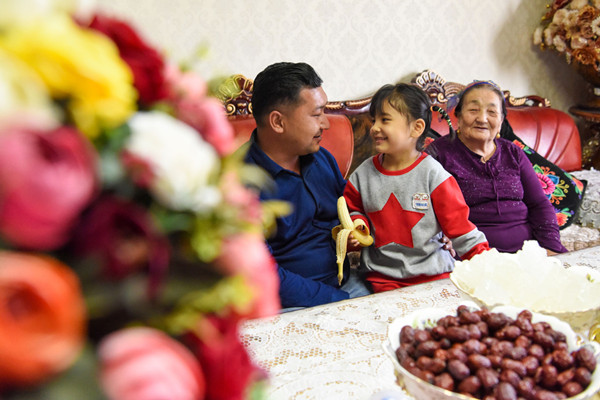White paper shows human rights progress

A Uygur family in Yuli county, Northwest China's Xinjiang Uygur autonomous region, April 15, 2021. [Photo/Xinhua]
Although China has made constant efforts to inform the world about its human rights developments, some Western countries choose to ignore the facts and use attacks on the nation's human rights issues as a political tool to curb the country's development, human rights experts said.
Over the past century, the Communist Party of China has invested a huge amount of effort in human rights protection, contributing significantly to global progress in the area, according to a white paper on the practices of the CPC in respecting and protecting human rights released by the State Council Information Office on Thursday.
Despite the progress made in improving Chinese people's economic, social and cultural rights as well as their civil and political rights and the right of religious beliefs, some Western countries still turn a blind eye to the facts and make ungrounded accusations, Lu Guangjin, secretary-general of the China Society for Human Rights Studies, said on Thursday.
These countries don't actually care about Chinese people's rights and use them as an excuse to interfere in China's internal affairs and prevent it from growing stronger, Lu said. "Such moves clearly have a political agenda rather than being the result of simple misunderstandings," he said.
On accusations by some Western politicians on human rights issues in the Xinjiang Uygur autonomous region, Lu said, "If they really care about the human rights of people in Xinjiang, why didn't they condemn the violent acts when terrorist attacks occurred in the region?"
Since the 18th National Congress of the CPC in late 2012, the Party has attached greater importance to improving the systems and mechanisms for respecting and protecting human rights. The principle that "human rights should be fully respected and protected" was included in the report to the congress.
China has been continuously communicating its views on human rights protection to the world, said He Zhipeng, executive director of Jilin University's Human Rights Research Institute. "We have answered questions from many foreign organizations and governments on the country's human rights issues, so the international community can learn about key actions taken by China in the sector," He said.
China has signed 26 international human rights instruments, including six core United Nations conventions. The country has had constructive talks with relevant treaty bodies and adopted their suggestions in accordance with the actual conditions in China, according to the white paper.
The country has also undertaken three cycles of the UN Human Rights Council Universal Periodic Review process since 2009, with its reports being adopted, and it has given due attention and responsible feedback to all suggestions from other countries. Most countries have affirmed China's achievements in this regard and its contribution to international human rights, the paper said.
Many proposals raised by China, such as the concept of building a community with a shared future for mankind, actually are closely related to improving the human rights of people around the world in different aspects, including their rights to employment, basic living, social security, health, education, culture, environment and property that are essential to the rights of all to life and development, He said.

